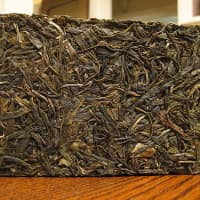Fuzhuan Tea (also called Fu Tea, Fu Zhuan Tea, or Chinese Brick Tea) is a type of fermented tea made from the Camellia sinensis plant. Fu Zhuan Tea is fermented with the fungus, Erotium cristatum (Eurotium cristatum), and contains a unique phytochemical profile attributed to its unique method of processing.[1]
Healing Properties
- Regulation of blood lipids.
- Immune activation effects: of the fungus, Eurotium cristatum, found in Fu Zhuan Tea.[2]
Disease / Symptom Treatment
- Hyperlipidemia: A condition in which there are high levels of fat particles (lipids) in the blood. Examples of lipids include cholesterol and triglycerides. These substances can deposit in blood vessel walls and restrict blood flow. This creates a risk of heart attack and stroke.
- Cardiovascular disease:[1:3]
- Type 2 diabetes:[1:4]
-
Featured Product
 1994 Menghai Zun Cha Brick
1994 Menghai Zun Cha Brick
This 250 gram brick is made from fermented 9th grade leaf base. Ninth grade indicates the leaf size. Do not pass this by, it is an amazing and smooth aged cake that flakes off easily. Discover the wonderful aged teas that are sought after by those in the know.
Title: Fermented Camellia sinensis, Fu Zhuan Tea, regulates hyperlipidemia and transcription factors involved in lipid catabolism
Author(s): Donghe Fu, Elizabeth P. Ryan, Jianan Huang, Zhonghua Liu, Tiffany L. Weir, Randall L. Snook, Timothy P. Ryan
Institution(s): Key Lab of Education Ministry for Tea Science, National Research Center of Engineering Technology for Utilization of Botanical Functional Ingredients, Hunan Agricultural University, Changsha 410128, China; Department of Clinical Sciences, Animal Cancer Center, Colorado State University, Fort Collins CO 80523, USA; Center for Rhizosphere Biology, Colorado State University, Fort Collins CO 80523, USA; Advanced Integrative Medicine, Lone Tree, CO 80124, USA; Governor’s Office, Occupational Health Epidemiology, Cheyenne WY 82002, USA
Publication: Food Research International
Date: November 2011
Abstract: Emerging evidence supports health-promoting properties of post-fermented Chinese Brick Tea. Fu Zhuan Tea, fermented with the fungus, Erotium cristatum, contains a unique phytochemical profile attributed to its unique method of processing. Fu Zhuan Tea has been shown to activate pancreatic enzymes and regulate blood lipids in laboratory models. Regulation of blood lipid levels by Fu Zhuan Tea consumption was examined in an observational pilot study of volunteers with elevated LDL cholesterol that were not taking any prescription lipid lowering medications. Significant changes in blood lipids were detected after 120 days of daily consumption. Fu Zhuan Tea fractionation led to the investigation of six compounds for regulation of transcription factors involved in lipid metabolism, including Farnesoid X receptor (FXR), Liver X-activated Receptor (LXR) and two isoforms of the Peroxisome Proliferator-Activated Receptors (PPARγ and PPARδ). Reporter gene assays with liver cells revealed dose dependent differences in regulation of transcription factor activation. These data reveal potential therapeutic efficacy and candidate molecular targets for Fu Zhuan Tea, and provide rationale for chemical characterization of bioactive fractions and investigation of therapeutic efficacy in cardiovascular disease and type 2 diabetes.
Link: https://doi.org/10.1016/j.foodres.2011.07.008
Citations: ↩︎ ↩︎ ↩︎ ↩︎ ↩︎Title: Immune activation effects of Eurotium cristatum on T cells through NF-κB signaling pathways in humans
Author(s): Zheng-Fei Yan, Pei Lin, MooChang Kook, Tae-Hoo Yi & Chang-Tian Li
Institution(s): Engineering Research Center of Edible and Medicinal Fungi, Ministry of Education, Jilin Agricultural University, Changchun, People’s Republic of China
Publication: Food and Agricultural Immunology
Date: 02 Mar 2017
Abstract: The immunization effect of Eurotium cristatum isolated from Fuzhuan brick-tea was evaluated. Ethyl acetate extraction (E2) had an increasing effect on T cell subset proportions. And then four compounds (physcion, echinulin, catenarin and emodin) were isolated from E. cristatum. The immunization effect of echinulin was observed through determining T cell subsets’ percentage, DNA synthesis and cytokine levels. It suggested that the immunization effect of compounds might work in relation to its structure. In addition, echinulin accelerated protein of p65, IκBα upregulation and nuclear translocation of p65 by the NF-κB signaling pathway. The result showed that the immunization effect of echinulin is closely related to the activation of NF-κB activity. Meanwhile echinulin increased transcript levels of p65 and IκBα in T cells at 200 μM (middle dosages group). It demonstrated that the immunization effection of echinulin on T cells is enhanced by activating NF-κB signaling pathway.
Link: https://doi.org/10.1080/09540105.2017.1293012
Citations: ↩︎
